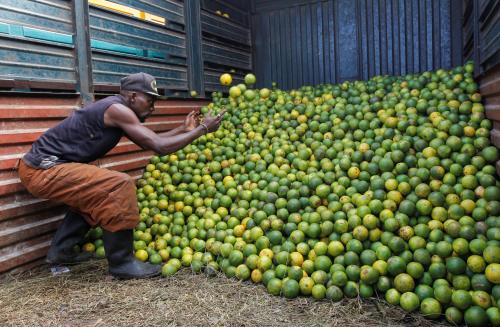On January 1, trading under the African Continental Free Trade Agreement (AfCFTA) officially commenced after years of planning and negotiations, and after facing delays due to the COVID-19 pandemic. While the AfCFTA has great potential to support economic development on the continent, because of internal inefficiencies within businesses or suboptimal business environments, some enterprises may not be able to take advantage of the agreement or compete with an influx of new competitors from other countries within the free trade area.
These potential challenges for businesses sparked some opposition to the AfCFTA in Nigeria and led Nigeria to be the one of the last countries to sign the agreement. In order to analyze the potential impact and challenges of the AfCFTA for Nigerian businesses, in 2020, the Nigerian Association of Chambers of Commerce, Industry, Mines, and Agriculture (NACCIMA) released the report “Impact of the African Continental Free Trade Area on Nigerian Micro, Small, and Medium Enterprises.” Micro, small, and medium enterprises (MSMEs) employ about 75 percent of the Nigerian workforce and are thus vital to the Nigerian economy.
The report surveys 1,804 MSMEs across Nigeria in four core sectors—agriculture, manufacturing, services, and wholesale/retail—in order to better understand the costs and benefits of the AfCFTA to these firms. As Figure 1 shows, Nigerian MSMEs that were aware of the AfCFTA were most concerned about the threat posed by imported cheaper goods competing with local products due to the AfCFTA, with more than 50 percent of the surveyed MSMEs reporting this as a perceived threat. Similarly, more than 40 percent of firms perceived threats from increased foreign competition and reduced demand for local goods due to the AfCFTA. In a focus group discussion conducted by NACCIMA as a follow-up to the survey, respondents further emphasized these concerns, with one CEO stating that “Nigerians are not loyal to brand but … favor cheaper goods.”
Figure 1. Perceived threats of AfCFTA to MSMEs in Nigeria
Source: NACCIMA, Impact of the African Continental Free Trade Area on Nigerian Micro, Small, and Medium Enterprises, 2020
However, the survey also found that relatively few Nigerian MSMEs were aware of the existence of the AfCFTA: Among all surveyed MSMEs, only 25 percent of firms reported such awareness. Figure 2 disaggregates these numbers by sector and shows that firms in agriculture and services have by far the lowest awareness of the AfCFTA. In contrast, far more manufacturing and wholesale/retail trade firms—although still substantially less than 50 percent—were aware of the AfCFTA. The report states that these results signify a major gap in policy communications and a severe lack of knowledge about the AfCFTA among MSMEs in key sectors that will be affected by the implementation of the agreement, as well as a low level of engagement by MSMEs in the preparations for the commencement of the AfCFTA. It is worth noting, however, that this survey was undertaken prior to September 2020; awareness of the AfCFTA in Nigeria may have increased since then, as federal agencies have since initiated AfCFTA communications campaigns.
Figure 2. Reported awareness of the AfCFTA by enterprise sectors of Nigerian MSMEs
Source: NACCIMA, Impact of the African Continental Free Trade Area on Nigerian Micro, Small, and Medium Enterprises, 2020
The report concludes by emphasizing the importance of ensuring that the AfCFTA benefits Nigeria’s MSMEs, as these firms are crucial to the Nigerian economy and for job creation. Moreover, the authors argue that, without an active strategy to ensure that MSMEs are aware of the AfCFTA and put in a position to capitalize on the agreement, the AfCFTA’s positive impact on the Nigerian economy will remain minimal. To achieve these goals, the report suggests that the federal government of Nigeria develop an information dissemination strategy specifically targeted to MSMEs and provide MSMEs with easier access to finance in order to allow them to invest in gathering information.
For more on the start of trading under the AfCFTA, see Hippolyte Fofack’s recent publications, “Mitigating short-term adjustment costs: Preparing for the AfCFTA” and “Making the AfCFTA work for ‘The Africa We Want.’”






Commentary
Figure of the week: Perceptions of the AfCFTA among small enterprises in Nigeria
January 6, 2021